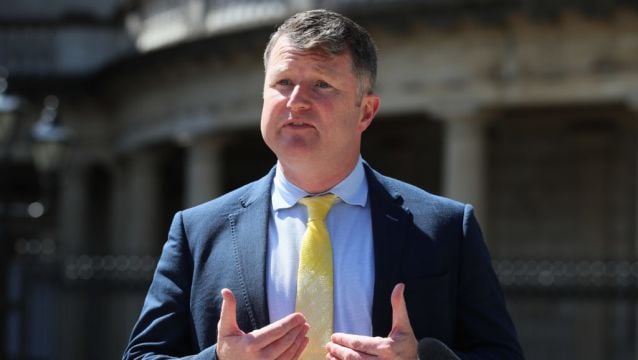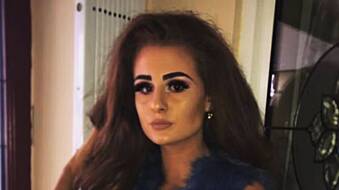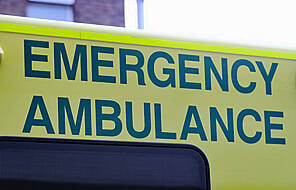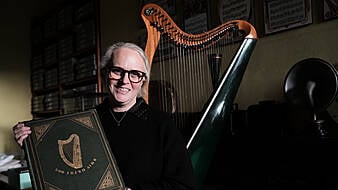Senator Malcolm Byrne, who recently became the first candidate to declare his intention to contest the next general election in the newly created Wicklow-Wexford constituency, has said it presents "new opportunities" for the communities included.
The new constituency was announced following the Electoral Commission’s constituency review.
The new constituency includes large areas of south Wicklow and north Wicklow, with Arklow and Gorey being the biggest towns.
Wicklow and Wexford have a combined total of 11 seats, with the new three-seat constituency in between two four-seaters.
The Wicklow-Wexford constituency has been criticised by locals, councillors, and some TDs who feel it is unfair due to the large area which will be represented by three TDs.
However, Mr Byrne feels it can be a positive thing. He told BreakingNews.ie: "I think it presents a new opportunity. There are lots of common issues between people in both Wicklow and Wexford. There was a logic to the decision of the independent Electoral Commission.
"I certainly think for people in Arklow, Gorey, all the villages and rural communities right across the new constituency, there is a new opportunity there. It’s important that we elect representatives that can be effective at national level to raise issues of concern to our communities and I hope to be one of them."
The Fianna Fáil senator has been in politics for his whole career and was first elected to Gorey Town Council in 1999.
He ran in the 2016 general election, and was selected to contest the 2019 European Parliament elections, before winning a Dáil seat in the 2020 by-election that was triggered by Mick Wallace's election to the European Parliament.
Mr Byrne feels his experience in local and national politics can help him in the upcoming general election.

"The reason I’m running is I’ve been involved in organisations in the community all my life and I believe that I understand both the urban and rural needs of the new constituency.
"My first step is to hopefully secure the nomination of my party to contest that, and if successful, to convince the people of south Wicklow and north Wexford to support me."
He said this is why he chose to focus on the next general election despite being nominated by Fianna Fáil colleagues for the European elections in June.
"I’m fascinated by politics, but more importantly, about how through the political process, you can work to improve people’s lives. I’m grateful to members of Fianna Fáil who nominated me to contest the European elections again this June, but I made a decision to look at contesting the general election and to indicate my intention is to focus on the new constituency of Wicklow-Wexford.
"It’s a big area, and as people who live here know, after the last general election there was no TD elected from the south Wicklow or north Wexford areas. Geography obviously matters, but I think what’s particularly important is that whoever we elect is capable of performing at a national level, being able to enact legislation that makes a difference in the country but to also effectively represent the area.
"The reason why the new constituency was created is the rapid growth in counties Wicklow and Wexford. We know in the Gorey local electoral area alone, between the censuses of 2016 and 2022, the population grew by over 14 per cent… one of the fastest rates in the country.
"In the case of Arklow, with the waste water works currently being completed, there is huge potential for that town to grow rapidly now as well."
Mr Byrne added: "Ensuring that we get the matching services for both Gorey and Arklow with that rapid growth is vital. We also have to balance that with the needs of a lot of the rural communities. Villages like Kilmuckridge, Bunclody, Carnew, they will continue to need investment and sustainable rural communities.
"For Gorey and Arklow the challenges are around additional housing, further pressure on schools. I certainly know that in terms of access to doctors, dentists and healthcare... these are challenges of a rapidly growing society, and we have to be able to respond."
There has been much speculation about the possibility of a Sinn Féin-Fianna Fáil coalition after the next general election, but Mr Byrne feels there would be difficulties to this, adding "the outcome of the election is not pre-determined".
AI and deepfakes
Mr Byrne has spoken about the threats artificial intelligence (AI) and deepfakes pose to the electoral system, and he feels they may be an issue in the upcoming local and European elections as well as the next general election.
"I believe there are huge opportunities from artificial intelligence and new technologies, and we’re going to see that in areas like healthcare, transport and agriculture.
"There are also risks from AI and other technologies. I’ve spoken about the challenges of disinformation and deepfakes. We do need to be able to protect our democracy from those challenges.
"I think it’s going to be important for the current government and the next government to be on top of the technological revolution we are now experiencing… in terms of upskilling and re-skilling our citizens, but equally preparing us for any of the potential threats in employment or to our democracy."
He added: "It’s going to be a big political issue, and I think it’s important we have politicians who understand those issues, but I wouldn’t be surprised if during the course of an election or referendum campaign this year, questions around deepfakes emerged, and we have to have it on the agenda.
"We need a big debate and public information campaign around AI, algorithms, new technologies. How they operate and influence... so that people understand this and also, when we are presented with information online that we can question it, that we know what is coming from a reliable, fact-checked source, as opposed to misinformation being spread.
"It’s an obligation on all of us to understand this and for government and others to provide information in that debate. There’s an obligation on the tech companies to clamp down on disinformation and I expect that will happen."
Immigration
Immigration has been the biggest talking point in recent weeks, and while Mr Byrne feels housing and health remain the biggest voter priorities, he feels it will have an impact on the next election.
He said more public information on immigration policy would be positive. However, he stressed the need to differentiate between people with legitimate concerns about local facilities and the "small racist, far-right element spreading hatred and disinformation".
"Immigration is a big issue, and we do need to have a debate around immigration policy, but it must be evidence-based.
"I recently called for the need to explain in more detail immigration policy and what it is. How we respond to asylum seekers and refugees, to challenge some of the tropes that are put out there by the far-right.
"There are no hordes of unvetted people arriving into Ireland, anybody who arrives in Ireland has their fingerprints and details taken.
"Where there are problems, that is followed up. There is pressure in communities and I would say, yes, there is a small racist far-right grouping out there, but that group does not represent the majority of those who have concerns about particular facilities.
"In a lot of those cases, in communities around the country, it's a concern about a loss of facilities or the impact on local facilities. Where you take a local hotel out of circulation, it has an impact on downstream tourism businesses, but also it is a community facility that is gone and that is obviously a concern in the area.
"There are concerns around pressures on local schools, GPs, and so on. We need to be able to meet those concerns.
"I think it's important that we hear, and we engage directly with those concerns, while at the same time challenging some of those extremist far-right views that are deliberately trying to stir up hatred in our communities. Irish people are overwhelmingly welcoming and understand the difficult circumstances people have fled from in places like Syria and Ukraine, but at the same time, people obviously want to ensure they have the best of services in their local community.
"While there are legitimate concerns, they have to be divorced from people who simply want to stir up hatred."
He added: "Talking with people in Rosslare for example, who have genuine concerns about the sustainability of services in the community, is a very different situation to those who have no interest in the community services but simply want to stir up hatred."
I think for the people of north Wexford and south Wicklow it provides a real opportunity.
Returning to the new constituency, Mr Byrne emphasised the positives he feels it can bring to locals. "I think for the people of north Wexford and south Wicklow it provides a real opportunity.
"There are no representatives in the Oireachtas at the moment living in that area, expect myself. There will be three representatives elected. I hope to be one of them, and I think it's important that we represent urban and rural voters right across the new constituency but realise the potential and opportunity of our area.
"In many ways, the new constituency is almost a reflection of modern Ireland. You have rapidly growing towns in Gorey and Arklow. You have a very large rural hinterland with a lot of significant villages - Bunclody, Carnew, Ferns, Shillelagh, Tinahealy, Kilmuckridge - all of those have very big rural hinterlands and the farming communities are a very important part pf the new constituency.
"We're also going to have huge opportunities in terms of offshore renewable energy, which will develop over the next decade, and it's critical that our coastal communities in the new constituency get to benefit from that.
"The new constituency is a microcosm of Ireland as a whole and I think it will be a very interesting election. I'm very happy to be the first to declare my hope to represent that constituency, and it will ultimately be a decision for the voters."







